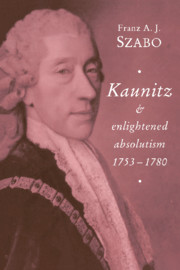6 - Church and state
Published online by Cambridge University Press: 28 August 2009
Summary
The implementation of the Counter-Reformation had decisively shaped the Habsburg Monarchy in the seventeenth century. Trentine Catholicism became in many ways the integrating ideology of the highly pluralistic patrimony of the Habsburgs, and this involved not merely a set of confessional dogmas, but broader patterns of thought and culture inextricably intertwined with a social and political infrastructure which had grown out of the economic and social upheavals of the late sixteenth and early seventeenth centuries. If there is some dispute on whether we may apply the term “confessional state” to this polity, there is little doubt that confessional issues set the predominant tone of the culture and of society, and that the Catholic Church emerged as an institution of enormous power and influence. It is therefore not surprising that when this polity proved unequal to its tasks in the highly competitive world of proto-national states in the first half of the eighteenth century, confessional issues and the role of the Catholic Church would be in many ways central problems for the Habsburgs. In the ensuing reforms the relations between Church and State were fundamentally altered. Because of the degree of integration between political and confessional issues in the Counter-Reformation state, however, these reforms were not effected in discrete confessional spheres, but had broad social, economic and political consequences.
- Type
- Chapter
- Information
- Kaunitz and Enlightened Absolutism 1753–1780 , pp. 209 - 257Publisher: Cambridge University PressPrint publication year: 1994

